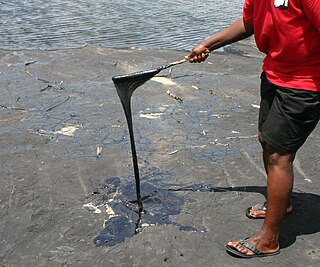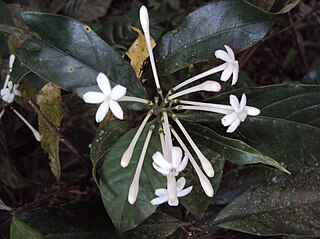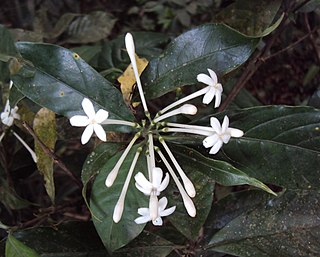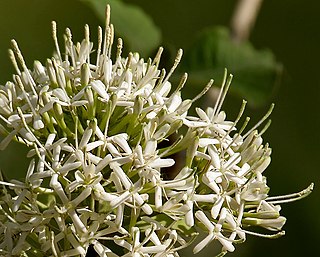
Tar pits, sometimes referred to as asphalt pits, are large asphalt deposits. They form in the presence of oil, which is created when decayed organic matter is subjected to pressure underground. If this crude oil seeps upward via fractures, conduits, or porous sedimentary rock layers, it may pool up at the surface. The lighter components of the crude oil evaporate into the atmosphere, leaving behind a black, sticky asphalt. Tar pits are often excavated because they contain large fossil collections.

The Chernobyl Nuclear Power Plant, officially the Vladimir Lenin Nuclear Power Plant, is a closed nuclear power plant located near the abandoned city of Pripyat in northern Ukraine 16.5 kilometers (10 mi) northwest of the city of Chernobyl, 16 kilometers (10 mi) from the Belarus–Ukraine border, and about 100 kilometers (62 mi) north of Kyiv. The plant, named after Vladimir Lenin, was cooled by an engineered pond, fed by the Pripyat River about 5 kilometers (3 mi) northwest from its juncture with the Dnieper.

The Evangelical Presbyterian Church in England and Wales (EPCEW) is a reformed and conservative evangelical Presbyterian denomination in England and Wales with churches in Germany, Switzerland, and Sweden. Founded in 1996, the denomination is small but growing.

Armeria maritima, the thrift, sea thrift or sea pink, is a species of flowering plant in the family Plumbaginaceae. It is a compact evergreen perennial which grows in low clumps and sends up long stems that support globes of bright pink flowers. In some cases purple, white or red flowers also occur. It is a popular garden flower and has been distributed worldwide as a garden and cut flower. It does well in gardens designed as xeriscapes or rock gardens. The Latin specific epithet maritima means pertaining to the sea or coastal.

Tarenna is a genus of flowering plants in the family Rubiaceae. There are about 370 species distributed across the tropical world, from Africa, Asia, Australia and the Pacific Islands.
Tarenna drummondii is a species of plant in the family Rubiaceae. It is found mainly in Kenya and Tanzania in East Africa.
Tarenna monosperma is a species of plant in the family Rubiaceae. It is native to Kerala and Tamil Nadu in India.

Tarenna nilagirica is a species of plant in the family Rubiaceae. It is native to Karnataka and Kerala in India.
Tarenna quadrangularis is a species of plant in the family Rubiaceae. It is endemic to Tanzania.

An arborloo is a simple type of composting toilet in which feces are collected in a shallow pit and a fruit tree is later planted in the fertile soil of the full pit. Arborloos have: a pit like a pit latrine but less deep; a concrete, ferrocement or other strong floor; a superstructure to provide privacy; and possibly a ring beam to protect the pit from collapsing. The pit should remain well above the water table in the soil, so as to not contaminate groundwater.

The pit, named after the hard core found in fruits such as peaches and apricots, is the core of an implosion nuclear weapon – the fissile material and any neutron reflector or tamper bonded to it. Some weapons tested during the 1950s used pits made with U-235 alone, or in composite with plutonium, but all-plutonium pits are the smallest in diameter and have been the standard since the early 1960s.

Benkara is a genus of flowering plants in the family Rubiaceae. It is found in tropical and subtropical Asia from India east to China and the Ryukyu Islands, south to Java and the Philippines. It was described by Michel Adanson in 1763.

Solar power in Denmark contributes to a goal to use 100% renewable energy by 2050. The goal of 200 MW of photovoltaics by 2020 was reached eight years early, in 2012, and 36 MW was being installed each month. Denmark had 790 MW in late 2015. A total of 3,400 MW is expected to be installed by 2030. Many solar-thermal district heating plants exist and are planned in Denmark.

Pavetteae is a tribe of flowering plants in the family Rubiaceae and contains about 624 species in 9 genera. Its representatives are found from the tropics and subtropics of the Old World and the southern Pacific region.
Drypetes hoaensis is an Asian tree species in the family Putranjivaceae.

Tarenna sechellensis is a species of plant in the family Rubiaceae. It is known from the Seychelles, Madagascar and Mayotte. The English botanist John Gilbert Baker was the first to formally describe this species in 1877, subsequently V. S. Summerhayes assigned the species to the genus Tarenna.
Hypericum australe is a species of plant in the family Hypericaceae. Individuals can grow to 24 cm tall.

A referendum on the Urgent Consideration Law was held in Uruguay to ask the electorate if 135 articles of Law 19,889 – approved by the General Assembly in 2020 and considered as the main legislative initiative of the coalition government of President Luis Lacalle Pou – should be repealed. It was the result of a campaign promoted by various social and political actors such as the national trade union center PIT-CNT and the opposition party Broad Front. On 8 July 2021, almost 800,000 adhesions were delivered to the Electoral Court, exceeding 25% of the total number of registered voters who are constitutionally required to file a referendum appeal against a law.












